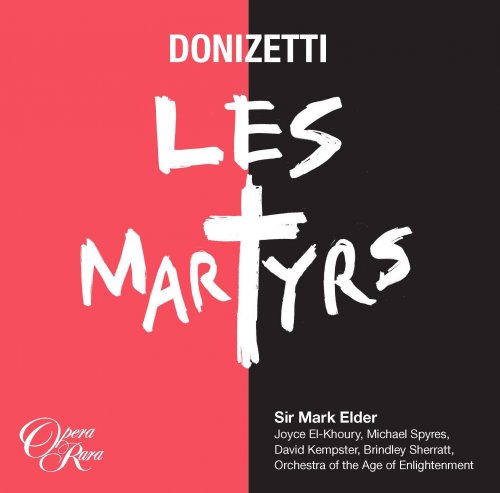Sir Mark Elder - Donizetti: Les Martyrs (2015)

Artist: Joyce El-Khoury, Michael Spyres, David Kempster, Brindley Sherratt, Opera Rara Chorus, Orchestra of the Age of Enlightenment, Sir Mark Elder
Title: Donizetti: Les Martyrs
Year Of Release: 2015
Label: Opera Rara
Genre: Classical
Quality: FLAC (image + .cue, log, booklet)
Total Time: 03:08:05
Total Size: 736 MB
WebSite: Album Preview
Tracklist:Title: Donizetti: Les Martyrs
Year Of Release: 2015
Label: Opera Rara
Genre: Classical
Quality: FLAC (image + .cue, log, booklet)
Total Time: 03:08:05
Total Size: 736 MB
WebSite: Album Preview
CD 1
ACT I
[1] Overture – Chorus 9’21
[2] ‘Amis... silence...’ – Chorus 4’02
[3] ‘Arrêtons-nous, Polyeucte’ 5’05
[4] ‘Que l’onde salutaire’ 2’03
[5] ‘Viens, suis-moi...’ 0’17
[6] ‘Que viens-tu nous apprendre ?’ 1’49
[7] ‘Eloignez de ces lieux’ 3’52
[8] ‘Jeune souveraine’ 3’24
[9] ‘Allez ! laissez-moi maintenant’ 1’04
[10] ‘Toi qui lis dans mon cœur, Ô ma mère’ 1’56
[11] ‘Qu’ici ta main glacée’ 2’57
[12] ‘O Dieu tutélaire !’ 2’14
[13] ‘Pauline !...’ 4’40
[14] ‘Quel danger nous menace’ 1’41
[15] ‘Objet de ma constance’ 3’30
ACT II
[16] ‘Achevez ! Pollion, – transcrivez ces édits’ 1’36
[17] ‘Dieux des Romains, dieux de nos pères’ 3’42
[18] ‘Viens, ma fille ; je sais que ta pieuse haine’ 2’26
[19] ‘Mort à ces infâmes’ 1’31
[20] ‘Tout mon sang se glace’ 2’08
[21] ‘D’où te vient, mon enfant’ 1’35
[22] ‘Déjà l’on voit au loin’ 1’41
[23] ‘Sévère existe !... Un dieu sauveur’ 3’10
[24] ‘Gloire à vous, Mars et Bellonnne !’ 5’26
[25] ‘Valeureux habitants de l’antique Arménie’ 1’30
[26] ‘Amour de mon jeune âge’ 2’44
[27] ‘C’est son père’ 0’27
[28] ‘Les dieux ont conservé des jours si précieux !’ 1’16
CD 2
[1] ‘Lutte des Gladiateurs’ 3’37
[2] ‘Pas de deux’ 4’58
[3] ‘Danse Militaire’ 8’45
[4] ‘De Décius, notre souverain maître’ 2’18
[5] ‘Soutenez-moi ! Divinité suprême !’ 1’54
[6] ‘Voilà le proconsul’ 1’15
[7] ‘O blasphèmes nouveaux !’ 1’24
[8] ‘Dieu puissant qui vois mon zèle’ 4’37
ACT III
[9] ‘Dieux immortels, témoins de mes justes alarmes’ 4’36
[10] ‘En touchant à ce rivage’ 5’22
[11] ‘Ne vois-tu pas, qu’hélas !’ 3’59
[12] ‘C’est Polyeucte !... mon époux’ 2’11
[13] ‘Mon seul trésor, mon bien suprême’ 4’18
[14] ‘O mon fils !...’ 2’17
[15] ‘Oui, j’irai dans leurs temples !’ 2’54
[16] ‘Dieu du tonnerre’ 5’11
[17] ‘A tes pieds, proconsul’ 1’37
[18] ‘Quoi ! des dieux la voix sainte’ 2’08
[19] ‘Jusqu’au sein du sanctuaire’ 4’34
[20] ‘Lui-même a voulu son supplice’ 2’08
[21] ‘Je crois en Dieu’ 3’40
CD 3
ACT IV
[1] ‘L’arrêt est prononcé’ 2’05
[2] ‘Oui, par la foi jurée’ 1’57
[3] ‘O dévouement sublime !’ 2’18
[4] ‘Oui, venez arracher Polyeucte au trépas !’ 1’28
[5] ‘Leur voix immortelle’ 3’06 130
[6] ‘Rêve délicieux dont mon âme est émue’ 4’52
[7] ‘Seigneur, de vos bontés il faut que je l’obtienne !’ 1’23
[8] ‘Pour toi, ma prière’ 3’28
[9] ‘Miracle soudain...’ 2’48
[10] ‘O sainte mélodie !’ 2’33
[11] ‘Il nous faut et des jeux et des fêtes’ 1’12
[12] ‘Au peuple impatient nous devons ce spectacle’ 1’40
[13] ‘Grands dieux !’ 4’50
[14] ‘Ah ! voici le signal du supplice !’ 3’02
Coming in at a tidy three hours and eight minutes, Donizetti’s huge Les Martyrs, composed (or adapted) for Paris in 1840, is here presented in its fullest conceivable form, including ballet and many passages cut right after the first performances. The opera was a reworking of his 1838 Poliuto, composed for the San Carlo in Naples, which had been banned by the king himself, since Christian martyrdom under the Romans was found unpleasant by the censors and the king was devoutly religious. (Donizetti and his librettist did everything they could to make the story into a tale of jealousy instead, but it was still too sacrilegious.)
Donizetti took the idea to Paris, where he had been having enormous success with Lucia, its French version, Lucie de Lammermoor, L’elisir d’amore, and others, and Eugène Scribe was called in to flesh out the libretto to the mammoth size preferred by the French. The plot is not complicated: Pauline, the daughter of the anti-Christian governor, Felix, was married to the Roman Proconsul, Sévère, who was believed to have died in battle; she is now married to the magistrate Polyeucte, who has secretly been baptized. Sévère returns and true love vs public duty vs loyalty vs clemency become the themes, with the real battle fought as the curtain falls: Christians vs lions. The opera was premiered at the Paris Opera in April of 1840, while La fille du regiment was still playing across town. It was Donizetti’s world, much to the horror of Berlioz.
I suspect we will never hear a better performance of this opera. The opera is, understandably, an odd meld of French and Italian music and conventions, and Mark Elder covers them all with great style and verve, neither “Frenchifying” the Cabaletta given to Sévère–a holdover from Poliuto–nor “Italianizing” the huge choruses and (somewhat tedious) ballet music. In some ways “Martyrs” is a mess–huge, pageant-like events take place just as we are getting involved in the characters’ personal stories and vice-versa–but there’s plenty of juicy music here and Elder and his period players make a meal of it. The chorus has plenty to do, whether impersonating Christians, pagans, or soldiers, and it does so with clarity.
The Polyeucte of Michael Spyres is remarkable. The role has one foot in bel canto and one in almost-heroic Meyerbeer and Verdi, and Spyres’ huge range (up to an E-natural at the close of his third-act aria, which may or may not have been written by the composer), clarion top, appealing tone, styles both exclamatory and tender are ideal for the part. Joyce El-Khoury, as his wife, Pauline, has a fine, big lyric voice, at ease with the coloratura she’s given, fluent in cantilena, dramatically on-the-money, and capable of the loveliest high pianissimos. The tone is appealingly dusky at times, and the vibrato adds warmth without intruding.
The complicated Sévère–soldier, confused husband still in love with his wife–comes to life in the meaty baritone of David Kempster’s reading: a good performance. Brindley Sherratt also must acknowledge mixed feelings as Félix, Pauline’s father; being a one-sided tyrant fails when family gets involved. As the booming, angry Callisthenes, who wants all Christians expunged, Clive Bayley is properly one-sided. Néarque, Polyeucte’s Christian friend, is stalwart tenor Wynne Evans.
Another recording of this opera, recorded live in Venice (sung in French, as is this Opera Rara performance) some time in the 1970s and starring a riveting Leyla Gencer with Renato Bruson as a terrific Sévère, has been circulating for years. And fascinating as it is, it is this one that is a must-have. ~ Robert Levine, ClassicsToday.com
Donizetti took the idea to Paris, where he had been having enormous success with Lucia, its French version, Lucie de Lammermoor, L’elisir d’amore, and others, and Eugène Scribe was called in to flesh out the libretto to the mammoth size preferred by the French. The plot is not complicated: Pauline, the daughter of the anti-Christian governor, Felix, was married to the Roman Proconsul, Sévère, who was believed to have died in battle; she is now married to the magistrate Polyeucte, who has secretly been baptized. Sévère returns and true love vs public duty vs loyalty vs clemency become the themes, with the real battle fought as the curtain falls: Christians vs lions. The opera was premiered at the Paris Opera in April of 1840, while La fille du regiment was still playing across town. It was Donizetti’s world, much to the horror of Berlioz.
I suspect we will never hear a better performance of this opera. The opera is, understandably, an odd meld of French and Italian music and conventions, and Mark Elder covers them all with great style and verve, neither “Frenchifying” the Cabaletta given to Sévère–a holdover from Poliuto–nor “Italianizing” the huge choruses and (somewhat tedious) ballet music. In some ways “Martyrs” is a mess–huge, pageant-like events take place just as we are getting involved in the characters’ personal stories and vice-versa–but there’s plenty of juicy music here and Elder and his period players make a meal of it. The chorus has plenty to do, whether impersonating Christians, pagans, or soldiers, and it does so with clarity.
The Polyeucte of Michael Spyres is remarkable. The role has one foot in bel canto and one in almost-heroic Meyerbeer and Verdi, and Spyres’ huge range (up to an E-natural at the close of his third-act aria, which may or may not have been written by the composer), clarion top, appealing tone, styles both exclamatory and tender are ideal for the part. Joyce El-Khoury, as his wife, Pauline, has a fine, big lyric voice, at ease with the coloratura she’s given, fluent in cantilena, dramatically on-the-money, and capable of the loveliest high pianissimos. The tone is appealingly dusky at times, and the vibrato adds warmth without intruding.
The complicated Sévère–soldier, confused husband still in love with his wife–comes to life in the meaty baritone of David Kempster’s reading: a good performance. Brindley Sherratt also must acknowledge mixed feelings as Félix, Pauline’s father; being a one-sided tyrant fails when family gets involved. As the booming, angry Callisthenes, who wants all Christians expunged, Clive Bayley is properly one-sided. Néarque, Polyeucte’s Christian friend, is stalwart tenor Wynne Evans.
Another recording of this opera, recorded live in Venice (sung in French, as is this Opera Rara performance) some time in the 1970s and starring a riveting Leyla Gencer with Renato Bruson as a terrific Sévère, has been circulating for years. And fascinating as it is, it is this one that is a must-have. ~ Robert Levine, ClassicsToday.com


![Turku Jazz Orchestra & Henri Lyysaari - The Labyrinth Garden (2026) [Hi-Res] Turku Jazz Orchestra & Henri Lyysaari - The Labyrinth Garden (2026) [Hi-Res]](https://www.dibpic.com/uploads/posts/2026-02/1770128890_folder.jpg)
![Rahsaan Roland Kirk - Now Please Don't You Cry, Beautiful Edith (2025 Remaster) (2026) [Hi-Res] Rahsaan Roland Kirk - Now Please Don't You Cry, Beautiful Edith (2025 Remaster) (2026) [Hi-Res]](https://www.dibpic.com/uploads/posts/2026-01/1769782162_cover.jpg)
![Chris Forsyth - Chris Forsyth Plays Love Devotion Surrender (2024) [Hi-Res] Chris Forsyth - Chris Forsyth Plays Love Devotion Surrender (2024) [Hi-Res]](https://www.dibpic.com/uploads/posts/2026-02/1770021495_cover.jpg)



